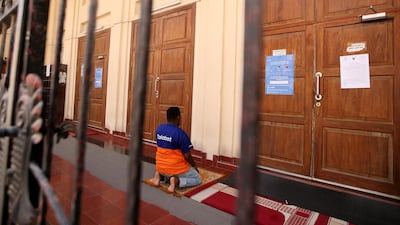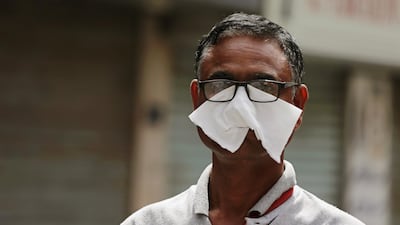A few weeks ago, while Kai Miethig was out cycling along Bahrain's King Faisal Highway, he noticed a pile of discarded cigarettes strewn across a sandbank next to the corniche. "Every Saturday, I usually run from Bahrain Financial Harbour to Reef Island and back that same way, but this time I found too many cigarette butts," the German architect tells The National.
Instead of simply ignoring the pollution, he decided to do something about it. So he went back the next day, armed with a few 600-millilitre plastic bottles he’d been meaning to recycle, and ended up stuffing some 800 stubs in them in the space of one hour.
The island resident then went out for 10 days over the space of two weeks and collected a total of 7,687 cigarette butts, stopping only once the area was completely clear of them.
Physical activity meets environmental activism
Bahrain, like the rest of the world, has enforced a number of social-distancing regulations amid the coronavirus crisis, including closing down restaurants and having people work from home.
Residents wearing face masks are still allowed outside to exercise, however, and so Miethig felt this was the perfect opportunity to combine some physical activity with environmental activism.
He called it the Bahrain Butt Collection Challenge.
“You can do a duck-walk from one metre to the next, then squat down and collect cigarette butts in that area. You just have to wear gloves,” he says. “Everybody during the coronavirus time is doing a workout challenge and blah, blah, blah challenge, but no one is doing something for the environment,” he says.
Yet, while Miethig tried to get other people to join in, he said people were apprehensive. “A lot of people are doing fitness activities and running, but when it comes to cleaning other people’s [rubbish] they’re not fussed,” the 'wastrepreneur' adds.
Miethig is no stranger to heading up eco initiatives, after all. He’s the founder of W-AI-STE, which implements artificial intelligence in the process of waste management, as well as a keen member of CleanUp Bahrain and, most recently, he worked with the region’s Spartan Race organisers to collect litter at the last obstacle course they held in his adopted home country. This included 10 boxes of banana peels and 46 bags of bottles and caps.
‘Bahrain is like the living room’
Miethig has been living in Bahrain since 2007, when he moved over from the UAE, where he’d helped to build the first zero-steel-waste precast factory in Dubai, as well as the Formula One track in Abu Dhabi.
“Bahrain was calm and cosy,” he says, while reminiscing on the days when Sheikh Zayed Road was only three lanes and “very congested”.
This photo gallery shows what life is like in Bahrain amid the coronavirus pandemic:
“I always say Dubai is like the showroom, while Bahrain is like the living room.”
And he’s determined to keep his living room clean; he’s already planning the next cigarette butt collection challenge in another particularly polluted area of the island, and he’s decided to create a stand-up paddle board out of the stubs he’s picked up. This idea was inspired by a similar project in Australia, and the paddle board will eventually be available to rent from Beach Culture at Bahrain Bay, the proceeds of which will go to a charity that’s yet to be determined.
“First we need a sponsor to pay the cost to build the board, so it will probably launch after summer,” he adds.
#BahrainIsNotAnAshtray
Roughly 2.5 million cigarette butts are littered in Bahrain every day, Miethig has figured out using world estimates. About 30 to 40 per cent are thrown in the bins, meaning more are discarded on the ground than anywhere else. This is in a country where the population is only around 1.2 million.
Overall, cigarette butts account for about 30 per cent of the world’s litter, and this has serious consequences for nature, he says, as they’re non-biodegradable, contain toxins that can seep into soil and can be eaten by wildlife.
“I created a hashtag #BahrainIsNotAnAshtray and this can be used for every region or every country.”
A war on plastic
Miethig is also concerned with the amount of plastic waste he comes across. As a freelance consultant, he is currently working on a training programme for Carrefour staff on how to convince customers to use fewer plastic bags, and his next mission is to produce a documentary for the region, based on the 2016 film A Plastic Ocean by Craig Leeson.
Since we are in the Middle East, which mainly has desert as land, I want to produce a documentary called A Plastic Desert
“We started screening it here as an environmental awareness programme. But the problem is not only with the ocean, but the land, too, obviously.
"Since we are in the Middle East, which mainly has desert as land, I want to produce a documentary called A Plastic Desert."
This project would see him ride a camel from Dubai to Bahrain in the days between the country’s two National Days (December 2 and December 16, respectively). He would do so via Saudi Arabia.
“The weather is perfect and I can sleep in the ‘five billion star hotel’,” he says. “I did calculations and it is 890 kilometres, and a camel can do 60km to 70km a day. We’ll do three hours of camel riding, followed by a three-hour break, then a three-hour ride, and so on.
"Along the way, we would meet people, discuss the environment and collect plastic. It would be an awareness-raising camel trip.”
Benefits of first-time home buyers' scheme
- Priority access to new homes from participating developers
- Discounts on sales price of off-plan units
- Flexible payment plans from developers
- Mortgages with better interest rates, faster approval times and reduced fees
- DLD registration fee can be paid through banks or credit cards at zero interest rates
Tips%20for%20holiday%20homeowners
%3Cp%3EThere%20are%20several%20factors%20for%20landlords%20to%20consider%20when%20preparing%20to%20establish%20a%20holiday%20home%3A%3C%2Fp%3E%0A%3Cul%3E%0A%3Cli%3E%3Cstrong%3ERevenue%20potential%20of%20the%20unit%3A%3C%2Fstrong%3E%20location%2C%20view%20and%20size%3C%2Fli%3E%0A%3Cli%3E%3Cstrong%3EDesign%3A%20furnished%20or%20unfurnished.%3C%2Fstrong%3E%20Is%20the%20design%20up%20to%20standard%2C%20while%20being%20catchy%20at%20the%20same%20time%3F%3C%2Fli%3E%0A%3Cli%3E%3Cstrong%3EBusiness%20model%3A%3C%2Fstrong%3E%20will%20it%20be%20managed%20by%20a%20professional%20operator%20or%20directly%20by%20the%20owner%2C%20how%20often%20does%20the%20owner%20wants%20to%20use%20it%20for%20personal%20reasons%3F%3C%2Fli%3E%0A%3Cli%3E%3Cstrong%3EQuality%20of%20the%20operator%3A%3C%2Fstrong%3E%20guest%20reviews%2C%20customer%20experience%20management%2C%20application%20of%20technology%2C%20average%20utilisation%2C%20scope%20of%20services%20rendered%3C%2Fli%3E%0A%3C%2Ful%3E%0A%3Cp%3E%3Cem%3ESource%3A%20Adam%20Nowak%2C%20managing%20director%20of%20Ultimate%20Stay%20Vacation%20Homes%20Rental%3C%2Fem%3E%3C%2Fp%3E%0A
if you go
AI traffic lights to ease congestion at seven points to Sheikh Zayed bin Sultan Street
The seven points are:
Shakhbout bin Sultan Street
Dhafeer Street
Hadbat Al Ghubainah Street (outbound)
Salama bint Butti Street
Al Dhafra Street
Rabdan Street
Umm Yifina Street exit (inbound)
Key findings of Jenkins report
- Founder of the Muslim Brotherhood, Hassan al Banna, "accepted the political utility of violence"
- Views of key Muslim Brotherhood ideologue, Sayyid Qutb, have “consistently been understood” as permitting “the use of extreme violence in the pursuit of the perfect Islamic society” and “never been institutionally disowned” by the movement.
- Muslim Brotherhood at all levels has repeatedly defended Hamas attacks against Israel, including the use of suicide bombers and the killing of civilians.
- Laying out the report in the House of Commons, David Cameron told MPs: "The main findings of the review support the conclusion that membership of, association with, or influence by the Muslim Brotherhood should be considered as a possible indicator of extremism."
How to wear a kandura
Dos
- Wear the right fabric for the right season and occasion
- Always ask for the dress code if you don’t know
- Wear a white kandura, white ghutra / shemagh (headwear) and black shoes for work
- Wear 100 per cent cotton under the kandura as most fabrics are polyester
Don’ts
- Wear hamdania for work, always wear a ghutra and agal
- Buy a kandura only based on how it feels; ask questions about the fabric and understand what you are buying
Key facilities
- Olympic-size swimming pool with a split bulkhead for multi-use configurations, including water polo and 50m/25m training lanes
- Premier League-standard football pitch
- 400m Olympic running track
- NBA-spec basketball court with auditorium
- 600-seat auditorium
- Spaces for historical and cultural exploration
- An elevated football field that doubles as a helipad
- Specialist robotics and science laboratories
- AR and VR-enabled learning centres
- Disruption Lab and Research Centre for developing entrepreneurial skills
UAE currency: the story behind the money in your pockets
What sanctions would be reimposed?
Under ‘snapback’, measures imposed on Iran by the UN Security Council in six resolutions would be restored, including:
- An arms embargo
- A ban on uranium enrichment and reprocessing
- A ban on launches and other activities with ballistic missiles capable of delivering nuclear weapons, as well as ballistic missile technology transfer and technical assistance
- A targeted global asset freeze and travel ban on Iranian individuals and entities
- Authorisation for countries to inspect Iran Air Cargo and Islamic Republic of Iran Shipping Lines cargoes for banned goods
Specs
Engine: Electric motor generating 54.2kWh (Cooper SE and Aceman SE), 64.6kW (Countryman All4 SE)
Power: 218hp (Cooper and Aceman), 313hp (Countryman)
Torque: 330Nm (Cooper and Aceman), 494Nm (Countryman)
On sale: Now
Price: From Dh158,000 (Cooper), Dh168,000 (Aceman), Dh190,000 (Countryman)
Auron Mein Kahan Dum Tha
Starring: Ajay Devgn, Tabu, Shantanu Maheshwari, Jimmy Shergill, Saiee Manjrekar
Director: Neeraj Pandey
Rating: 2.5/5
Lexus LX700h specs
Engine: 3.4-litre twin-turbo V6 plus supplementary electric motor
Power: 464hp at 5,200rpm
Torque: 790Nm from 2,000-3,600rpm
Transmission: 10-speed auto
Fuel consumption: 11.7L/100km
On sale: Now
Price: From Dh590,000
Labour dispute
The insured employee may still file an ILOE claim even if a labour dispute is ongoing post termination, but the insurer may suspend or reject payment, until the courts resolve the dispute, especially if the reason for termination is contested. The outcome of the labour court proceedings can directly affect eligibility.
- Abdullah Ishnaneh, Partner, BSA Law
BUNDESLIGA FIXTURES
Friday (all kick-offs UAE time)
Hertha Berlin v Union Berlin (10.30pm)
Saturday
Freiburg v Werder Bremen (5.30pm)
Paderborn v Hoffenheim (5.30pm)
Wolfsburg v Borussia Dortmund (5.30pm)
Borussia Monchengladbach v Bayer Leverkusen (5.30pm)
Bayern Munich v Eintracht Frankfurt (5.30pm)
Sunday
Schalke v Augsburg (3.30pm)
Mainz v RB Leipzig (5.30pm)
Cologne v Fortuna Dusseldorf (8pm)
UAE v Zimbabwe A
Results
Match 1 – UAE won by 4 wickets
Match 2 – UAE won by 5 wickets
Match 3 – UAE won by 25 runs
Match 4 – UAE won by 77 runs
Fixture
Match 5, Saturday, 9.30am start, ICC Academy, Dubai
Sunday's games
Liverpool v West Ham United, 4.30pm (UAE)
Southampton v Burnley, 4.30pm
Arsenal v Manchester City, 7pm
Off-roading in the UAE: How to checklist
Series information
Pakistan v Dubai
First Test, Dubai International Stadium
Sun Oct 6 to Thu Oct 11
Second Test, Zayed Stadium, Abu Dhabi
Tue Oct 16 to Sat Oct 20
Play starts at 10am each day
Teams
Pakistan
1 Mohammed Hafeez, 2 Imam-ul-Haq, 3 Azhar Ali, 4 Asad Shafiq, 5 Haris Sohail, 6 Babar Azam, 7 Sarfraz Ahmed, 8 Bilal Asif, 9 Yasir Shah, 10, Mohammed Abbas, 11 Wahab Riaz or Mir Hamza
Australia
1 Usman Khawaja, 2 Aaron Finch, 3 Shaun Marsh, 4 Mitchell Marsh, 5 Travis Head, 6 Marnus Labuschagne, 7 Tim Paine, 8 Mitchell Starc, 9 Peter Siddle, 10 Nathan Lyon, 11 Jon Holland
The specs
- Engine: 3.9-litre twin-turbo V8
- Power: 640hp
- Torque: 760nm
- On sale: 2026
- Price: Not announced yet
Packages which the US Secret Service said contained possible explosive devices were sent to:
- Former first lady Hillary Clinton
- Former US president Barack Obama
- Philanthropist and businessman George Soros
- Former CIA director John Brennan at CNN's New York bureau
- Former Attorney General Eric Holder (delivered to former DNC chair Debbie Wasserman Schultz)
- California Congresswoman Maxine Waters (two devices)
SHADOWS%20AND%20LIGHT%3A%20THE%20EXTRAORDINARY%20LIFE%20OF%20JAMES%20MCBEY
%3Cp%3EAuthor%3A%20Alasdair%20Soussi%3C%2Fp%3E%0A%3Cp%3EPages%3A%20300%3C%2Fp%3E%0A%3Cp%3EPublisher%3A%20Scotland%20Street%20Press%3C%2Fp%3E%0A%3Cp%3EAvailable%3A%20December%201%3C%2Fp%3E%0A
More from Neighbourhood Watch:
The biog
Name: Greg Heinricks
From: Alberta, western Canada
Record fish: 56kg sailfish
Member of: International Game Fish Association
Company: Arabian Divers and Sportfishing Charters
COMPANY%20PROFILE
%3Cp%3E%3Cstrong%3ECompany%3A%3C%2Fstrong%3E%20Sideup%3Cbr%3E%3Cstrong%3EStarted%3A%3C%2Fstrong%3E%202019%3Cbr%3E%3Cstrong%3EFounder%3A%3C%2Fstrong%3E%20Waleed%20Rashed%3Cbr%3E%3Cstrong%3EBased%3A%3C%2Fstrong%3E%20Cairo%2C%20Egypt%3Cbr%3E%3Cstrong%3EIndustry%3A%3C%2Fstrong%3E%20technology%2C%20e-commerce%3Cbr%3E%3Cstrong%3EFunds%20raised%20so%20far%3A%3C%2Fstrong%3E%20%241.2%20million%3Cbr%3E%3Cstrong%3EInvestors%3A%3C%2Fstrong%3E%20Launch%20Africa%20VC%2C%20500%20Global%2C%20Riyadh%20Angels%2C%20Alex%20Angels%2C%20Al%20Tuwaijri%20Fund%20and%20Saudi%20angel%20investor%20Faisal%20Al%20Abdulsalam%3C%2Fp%3E%0A
Meydan Racecourse racecard:
6.30pm: The Madjani Stakes Listed (PA) | Dh175,000 | 1,900m
7.05pm: Maiden for 2-year-old fillies (TB) | Dh165,000 | 1,400m
7.40pm: The Dubai Creek Mile Listed (TB) | Dh265,000 | 1,600m
8.15pm: Maiden for 2-year-old colts (TB) | Dh165,000 | 1,600m
8.50pm: The Entisar Listed (TB) | Dh265,000 | 2,000m
9.25pm: Handicap (TB) | Dh190,000 | 1,200m
10pm: Handicap (TB) | Dh190,000 | 1,600m.
TICKETS
Tickets start at Dh100 for adults, while children can enter free on the opening day. For more information, visit www.mubadalawtc.com.
RACE CARD
5pm: Maiden (PA) Dh80,000 1,400m
5.30pm: Maiden (PA) Dh80,000 1,200m
6pm: Arabian Triple Crown Round-1 (PA) Listed Dh230,000 1,600m
6.30pm: HH The President’s Cup (PA) Group 1 Dh2.5million 2,200m
7pm: HH The President’s Cup (TB) Listed Dh380,000 1,400m
7.30pm: Wathba Stallions Cup (PA) Handicap Dh70,000 1,200m.
The specs
Engine: 2.0-litre 4-cyl turbo
Power: 201hp at 5,200rpm
Torque: 320Nm at 1,750-4,000rpm
Transmission: 6-speed auto
Fuel consumption: 8.7L/100km
Price: Dh133,900
On sale: now
Brief scoreline:
Manchester United 2
Rashford 28', Martial 72'
Watford 1
Doucoure 90'
RESULT
Deportivo La Coruna 2 Barcelona 4
Deportivo: Perez (39'), Colak (63')
Barcelona: Coutinho (6'), Messi (37', 81', 84')
Brief scoreline:
Liverpool 2
Mane 51', Salah 53'
Chelsea 0
Man of the Match: Mohamed Salah (Liverpool)
And%20Just%20Like%20That...
%3Cp%3E%3Cstrong%3EDirector%3A%3C%2Fstrong%3E%20Various%3C%2Fp%3E%0A%3Cp%3E%3Cstrong%3EStars%3A%3C%2Fstrong%3E%20Sarah%20Jessica%20Parker%2C%20Cynthia%20Nixon%2C%20Kristin%20Davis%3C%2Fp%3E%0A%3Cp%3E%3Cstrong%3ERating%3A%3C%2Fstrong%3E%203%2F5%3C%2Fp%3E%0A
Result
Tottenhan Hotspur 2 Roma 3
Tottenham: Winks 87', Janssen 90 1'
Roma 3
D Perotti 13' (pen), C Under 70', M Tumminello 90 2"
What is a calorie?
A food calorie, or kilocalorie, is a measure of nutritional energy generated from what is consumed.
One calorie, is the amount of heat needed to raise the temperature of 1 kilogram of water by 1°C.
A kilocalorie represents a 1,000 true calories of energy.
Energy density figures are often quoted as calories per serving, with one gram of fat in food containing nine calories, and a gram of protein or carbohydrate providing about four.
Alcohol contains about seven calories a gram.
PREMIER LEAGUE RESULTS
Bournemouth 1 Manchester City 2
Watford 0 Brighton and Hove Albion 0
Newcastle United 3 West Ham United 0
Huddersfield Town 0 Southampton 0
Crystal Palace 0 Swansea City 2
Manchester United 2 Leicester City 0
West Bromwich Albion 1 Stoke City 1
Chelsea 2 Everton 0
Tottenham Hotspur 1 Burnley 1
Liverpool 4 Arsenal 0
Indoor Cricket World Cup Dubai 2017
Venue Insportz, Dubai; Admission Free
Fixtures - Open Men 2pm: India v New Zealand, Malaysia v UAE, Singapore v South Africa, Sri Lanka v England; 8pm: Australia v Singapore, India v Sri Lanka, England v Malaysia, New Zealand v South Africa
Fixtures - Open Women Noon: New Zealand v England, UAE v Australia; 6pm: England v South Africa, New Zealand v Australia
Voy!%20Voy!%20Voy!
%3Cp%3E%3Cstrong%3EDirector%3A%3C%2Fstrong%3E%20Omar%20Hilal%3Cbr%3E%3Cstrong%3EStars%3A%3C%2Fstrong%3E%20Muhammad%20Farrag%2C%20Bayoumi%20Fouad%2C%20Nelly%20Karim%3Cbr%3E%3Cstrong%3ERating%3A%3C%2Fstrong%3E%204%2F5%3C%2Fp%3E%0A
Specs
Engine: Dual-motor all-wheel-drive electric
Range: Up to 610km
Power: 905hp
Torque: 985Nm
Price: From Dh439,000
Available: Now














